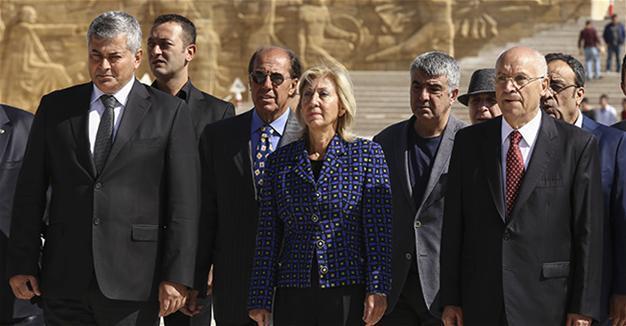Erdoğan’s remarks on treaty that formed modern Turkey irk opposition
ANKARA

AA photo
President Recep Tayyip Erdoğan’s suggestion that the Treaty of Lausanne, which largely gave Turkey its present borders instead of the rump state envisioned in the Treaty of Sèvres, was “presented as a victory” has drawn an angry reaction from the Republican People’s Party (CHP).Pointing to the historic significance of the treaty, CHP Ankara deputy Gülsün Bilgehan said Lausanne was the title deed of the Turkish Republic.
“Erdoğan can learn the importance of Lausanne from the cabinet meetings which he chairs these days. Because Lausanne is the title deed of the Turkish Republic and a certificate of honor for those who signed it as Mr. Erdoğan said in his message. In his speech today, he said ‘They cannot make us take one step back even if the whole world comes together.’ I invite him to read a real history book based on documents telling about Lausanne and İsmet Pasha [İnönü] to learn how it was made,” Bilgehan said in a written statement.
Bilgehan is also the grand-daughter of Turkey’s second president İsmet İnönü, who was the chief negotiator of the Turkish delegation in Lausanne
In addition, CHP Istanbul deputy Gürsel Tekin also condemned the president’s remarks on Lausanne, describing them as a “great shame.”
“I listened to Mr. President in dismay. It is extremely saddening that he disregarded a significant process such as Lausanne. The fact that he brings an important victory up for discussion is a great shame and I strongly reject it. I evaluate it as very inappropriate,” Tekin said.
Meanwhile, CHP Istanbul deputy Mahmut Tanal stated that discussing the Treaty of Lausanne amounted to saying “yes” to capitulations and colonialism, adding that Turkey would have ended up like Syria, Afghanistan or Pakistan without the treaty.
Speaking at a 27th gathering with village chiefs in Ankara on Sept. 29, Erdoğan said some had tried to present the Treaty of Lausanne as a victory.
“July 15 [coup attempt] is the second War of Independence for the Turkish nation. Let us know it like that. They [threatened] us with Sèvres in 1920 and persuaded us to [accept] Lausanne in 1923. Some tried to deceive us by presenting Lausanne as victory. In Lausanne, we gave away the [now-Greek] islands that you could shout across to,” he said.
“We are still struggling about what the continental shelf will be, and what will be in the air and the land. The reason for this is those who sat at the table for that treaty. Those who sat there did not do [us] justice, and we are reaping those troubles right now. If this coup had succeeded, they would have given us a treaty that would have made us long for Sèvres,” he added.
In July, Erdoğan had said the Treaty of Lausanne was the title deed of the republic in a message issued on the 93rd anniversary of its signing.
“The victory, which our glorious nation gained by faith, courage and sacrifice, was registered by transferring it to the ground of diplomatic and international law with the Treaty of Lausanne. This treatment is the title deed of our newly founded state,” Erdoğan said in his message.
Signed on July 24, 1923, the Treaty of Lausanne, which was signed by İnönü, who later succeeded Mustafa Kemal Atatürk as president, is regarded as the final treaty concluding World War I and which secured the foundation of the modern Republic of Turkey after the War of Independence against the occupying forces of Britain, France, Italy and Greece. The treaty recognized the boundaries of Turkey as well as the conditions under which non-Muslim minorities would live in the new republic.
















